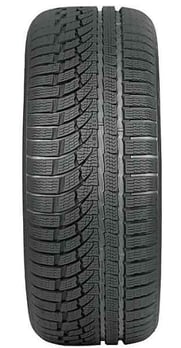.png)
Believe it or not, winter is right around the corner. Now's the time to prepare your fleet for cold temperatures and snowy or icy roads.
You might assume that you must switch from all-season tires to winter tires, but consider another option: all-weather tires.
For this blog post, we talked with Vip Kaushal at Kal Tire, who pointed out the numerous benefits of all-weather tires. Keep reading to learn why all-weathers could be the perfect option for your fleet.
WHAT'S SO SPECIAL ABOUT ALL-WEATHER TIRES?
All-Weather Tires Vs. All-Season Tires
First, let's differentiate between all-weather tires and all-season tires (which, despite their name, aren't meant for winter driving). The essential difference between them comes down to their rubber  compounds.
compounds.
When temperatures drop below +7 degrees, the compound of all-season tires gets harder. Therefore, they lose traction. In contrast, all-weather tires stay pliable until –25 degrees.
Think of it this way:
If you're wearing runners with pliable rubber soles, you’ll have decent traction if walking on ice. But imagine wearing solid skis on the soles of your shoes.
You'd be slipping and sliding all over the place. Harder soles mean less traction. Likewise, harder tires cannot handle snow and slush.
Are All-Weather Tires Good for All Winter Driving Conditions?
Slush, light snow, rain, and cold, dry pavement are all suitable conditions for all-weather tires. But for heavy snow, ice, and freezing rain, a dedicated winter tire is a better option. If your fleet operates in snow belt areas, you should opt for full winter tires, which stay pliable until –38 degrees.
Can You Use All-Weather Tires in Summer?
If all-weathers are helpful during winter conditions, how do they fare when temperatures rise during summer? Well, another upside of all-weather tires is versatility. They're also designed to handle summer conditions. So you won’t have issues with wear as you would with winter tires.
In a nutshell, all-season tires are good for only three seasons: spring, summer, and fall. All-weather tires are good for all four seasons.
How Do All-Weather Tires Benefit Fleets?
Driver safety is the foremost benefit of all-weather tires. Your drivers will less likely lose control on icy roads—and with fewer accidents, you'll save on everything from insurance to absences to vehicle repairs.
(To learn more about keeping drivers safe, see our blog Winter Driving Tips: How to Protect Fleet Drivers on the Road.)
With all-weather tires, you’ll also reduce tire costs. First, instead of buying two sets of tires (and switching them in spring and fall), you can simply use the same set all year round.
In addition, you'll eliminate the downtime associated with seasonal tire switching. Your drivers can stay on the road—with no stoppage in their productivity—rather than waiting for their vehicles to be outfitted for winter or for summer. Better yet, all-weather tires mean you need not worry about paying for tire storage.
Any Downside to All-Weather Tires?
All-weather tires generally don’t last as long as all-season and winter tires. That's because they must accommodate a wide range of temperatures. Also, they're on the road year round, not only seasonally.
But all-weathers combine the best of both worlds—and they're your ticket for easy tire maintenance. For more information, check out Kal Tire’s selection.
Conclusion
All-weather tires are a great option for fleets who want to keep drivers safe, save money, and reduce downtime. At the end of the day, choosing the right tires means you’ll have a safer, more productive fleet, and a stronger bottom line.
Next Step:
Download Fleet Management Checklist: 11 Tips for Success. This checklist will give you practical information on how to manage all your fleet's moving parts successfully.








